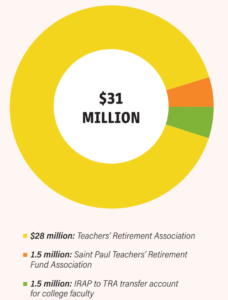The 2023-24 legislative session officially ended in May. The Legislature runs on a two-year cycle – the first year sets the budget, while the second year focuses on supplemental funding and policy changes.
Despite a tight non-budget year, lawmakers still prioritized support to current and future educators, who received a large amount of the one-time supplemental funding. We have provided a summary of the legislative session and answers to common questions below. If you have additional questions, please reach out to our lobby team at lobbyteam@edmn.org.
Education bills that passed this session
There were six major pieces of legislation pertaining to public education that passed this session. Those bills are listed below.
HF5040/SF4643 – Pensions

The only state funding to go to any pensions this year went to educators: the Legislature designated $31 million to improve teacher pensions. This funding includes $28 million for the Teachers’ Retirement Association, $1.5 million for the Saint Paul Teachers’ Retirement Fund Association and $1.5 million for the IRAP to TRA transfer account for college faculty.
The TRA money implements a new, lower normal retirement age that is a year earlier than scheduled. Teachers retiring this summer will save thousands of dollars that otherwise would have been lost to early retirement penalties. For Saint Paul TRA, the money will ease scheduled increases to employee contributions until 2026.
The pensions bill also allows a new bargaining topic: student loan payments can now be allowed to count towards an employer 403b match.
HF5237/SF5252 – Education Finance
This bill focuses on funding for new programs and providing clarifying information about funding, along with additional resources for programs passed last year. These programs include the READ Act, the Educator Compensation Working Group, the student teacher pay pilot program and clarification on highly qualified ESPs.
READ Act
The Legislature provided more funding and additional guidance for the READ Act, the literacy initiative passed in 2023. This supplemental funding includes $31 million for employee stipends for training in literacy instruction, along with $35 million for other supports around these trainings and $1 million for curriculum updates to ensure that curricula is culturally relevant.
For employees to receive these stipends, the local must negotiate an MOU with the district.
Educator Compensation Working Group
This bill includes the creation of an Educator Compensation Working Group that will bring together educators and legislators to discuss how below-market compensation for both teachers and ESPs contributes to the teacher shortage and to suggest solutions to address lagging educator pay. The group must bring their findings to the Legislature by Feb. 15, 2025.
Student Teacher Pay Pilot
As we covered in the last issue, the Legislature approved $6.5 million for a pilot program to pay student teachers for their training time in Minnesota classrooms. The program will cover about half of student teachers during the 2024-25 school year. Eligible institutions include St. Cloud State, Bemidji State, MSU Mankato, Winona State, Fond du Lac Tribal and Community College, UMN – Duluth, UMN – Crookston and Augsburg University.
Highly qualified ESPs
This bill also includes necessary changes to the “highly qualified” licensure requirement for special education and Title I school paraprofessionals, including training modules, adjusting the competency grid and clarifying the special education funding formula. The Legislature also made changes to ensure that ESPs are paid for early-release and delayed-start days. The changes also require sch
ool districts to include ESPs on district professional development committees to ensure that all workers have a voice at the table.
HF 3782/SF 3567 – Education Policy Bill
This bill includes changes, updates and clarifications to several education policies, including school cell phone policies, a ban on book bans, telehealth space requirements, ableism training, READ Act clarifications, special education licensure, charter schools and more. While this bill covers similar provisions as the finance bill, this one does not address funding.
School cell phone policies
This section requires districts and charter schools to adopt policies on students’ possession and use of cell phones in school. It requires the principals’ associations to collaborate to make available guidance on best practices and strategies to minimize the impact of cell phones on student behavior, mental health and academic attainment.
Schools must have their policies in place by March 15, 2025.
Banning book bans
This section prohibits a public library or a school library from banning, removing, or otherwise restricting access to a book/material based solely on its viewpoint or the messages, ideas or opinions it conveys.
Mental health instruction and telehealth space
These provisions require districts and charter schools to provide students in grades 4 through 12 with mental health instruction that aligns with local health standards, beginning with the 2026-2027 school year. The telehealth space policy requires school districts and charter schools to provide high school students with access to private spaces to receive mental health care via telehealth.
Ableism Training
This provision encourages districts and charter schools to include training on ableism and disability justice in professional activities for teachers and other staff. This training must be provided by a person with a disability and expertise related to ableism and disability justice.
READ Act
This section increases the number of literacy screenings for kindergarten through grade three students from twice yearly to three times yearly and allows schools to reduce instructional hours by 5.5 hours if that time is used for READ Act professional development.
Special Education Licensure
This section requires PELSB to establish a working group on special education licensure reciprocity and requires the group to submit a report to the Legislature by Feb. 1, 2025.
Charter Schools
This section makes changes to charter schools to increase services, accountability and best practices for charter schools. These policies include a requirement that charter schools adopt a language access plan—like the one school districts must adopt—to better serve English Language Learners. This provision also includes improvements in nepotism policy, training for charter school leaders, establishing an open bidding process and more rigorous market study before opening or expanding charter schools.
HF 3182/SF 3204 – Public Employee Insurance Plan modification
This bill is intended to address startling price hikes from health insurance corporations an provide relief for educators by modifying PEIP to stabilize the health care pool, ensuring that employee groups stay for at least four years—with the stipulation that employee groups can leave if facing extreme increases (over 20%). This is a best practice for reducing costs that should make the program a more competitive choice for educators.
HF 4077/SF 4097 – Commerce bill
This bill contains a transparency provision that requires health insurance carriers to specify the full cost of a policy when submitting bids to school districts. Under this law, health insurance companies will have to break down their costs by price per member per month and include broker fees. This enables a more apples-to-apples comparison of bids—something that was not possible before.
HF 5247/SF 5234 – Earned Sick and Safe Time (included in the tax omnibus bill) Within the omnibus tax bill is a bill that supports the implementation of ESST by clarifying that all sick leave counts as ESST and there is no need to maintain two “buckets” (as some districts have contended). This bill also establishes that employers may negotiate a waiver to self-attestation provisions in law to document use of ESST, although Education Minnesota does not recommend locals agree to this kind of waiver.

